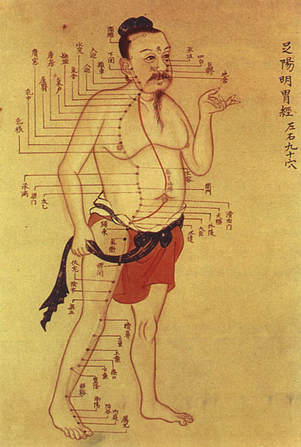 The traditional method of evaluating whether a treatment is beneficial in reducing pain is to measure it against placebo (a sham treatment that has no anticipated external beneficial effect) in a blinded trial (single, in this case, as it is a bit difficult to blind the practitioner as to whether they are giving real or sham treatment) and to use scales and questionnaires for patients to record their pain levels before and after treatment. Although the pain levels will be subjective the scales and questionnaires used are consistent and as such the results from a large population can be considered robust. In this meta-analysis editorial complementary medicine sceptics Colquhoun (pharmacologist) and Novella talk about the lack of evidence of any consistent placebo exceeding effects in over 3,000 papers regarding acupuncture. Recent research by Richard Harris (co-president of the society for acupuncture research) shows that there is an effect on the neurotransmitters in the brain which is very different for real as opposed to sham acupuncture. With traditional placebo effects such as sham acupuncture additional endorphines are released which reduces pain, with real acupuncture the effect seems to be that more receptors are created instead and in disorders like fibromyaglia where there appear to be an insufficiency of receptors this suggests the acupuncture is not just providing relief but is actively curing the condition. Perhaps the problem here is that we think of placebo as non-intervention, when in fact it can be a very powerful intervention. This research suggests that the placebo effect does necessarily not operate in addition to other pain relief effects for all interventions and so other effects with different long term consequences to the placebo effect may be being masked by this comparison to the placebo. Also notice the highlighted fields of expertise. I am not implying improper conflicts of interest , lack of fairness or intellectual rigour, just a mind-set. If you are a pharmacologist comparing two pills, which look smell taste and feel the same but have different active chemical ingredients then 'placebo' is just background noise and the difference must be entirely due to the ingredients...one assumes! Likewise if your field of expertise is under attack as being nothing more than placebo then maybe you have a vested interest in understanding more about what placebo is. I've always been interested in the idea of degrees of placebo and in the different capacity to to initiate placebo in different people at different times using different means. If osteopathy were placebo, would it matter if it were better placebo (for some people) than ibuprofen and if the pain relief generated allowed normal behaviours which in turn allowed the body to better heal itself? Hang on! Isn't that the meaning of one of the central tenets of osteopathy 'the body contains its own medicine chest'. I'm not suggesting that osteopathy is 'just' placebo but now that we know the placebo effect is real and isn't always present in the same way and at the same magnitude (therefore can be reduced, turned off or increased), isn't it something we should be trying to understand better and shouldn't we be a little more critical in appraisal of effect versus placebo in future? this blog entry was inspired by an article in the Guardian here
0 Comments
 A recent study by Public Health England suggested that 41% of Britons aged 40-60 fail to exercise so much as 10 consecutive minutes brisk walk each month. This is shocking, so much so that I have difficulty believing it, but even assuming it is an exaggeration it does highlight an underlying truth that a significant proportion of middle-aged Britons fail to do any significant exercise. The focus in the media is on the benefits to your heart. By walking just 10 continuous minutes at a brisk pace every day, an individual can reduce their risk of early death by 15%. They can also prevent or delay the onset of disability and further reduce their risk of serious health conditions, such as type 2 diabetes, heart disease, dementia and some cancers. The human body is not designed to be sedentary, it relies on movement for far too much. Obviously it survive without movement, people do, but it can't function properly. There are so many systems which rely on movement some more obvious than others, here's a few, by no means the full list Joint health - The joints are lubricated by synovial fluid, this nourishes the cartilage which lines the joints, the synovial fluid is spread across the joint surface by a combination of one surface of the joint wiping the fluid across another and by the loading and unloading of joint surfaces causing alternate high and low pressure and pumping the fluid around the joint, both of these processes need movement (weight bearing for the latter). Bone health - Bone density responds to loading both direct loading from weight-bearing and from the pull exerted by muscles. Activity, preferably weight-bearing, is therefore important to maintain bone-density, Circulatory health - The heart is not the only circulatory pump in the body, in fact it is not really up to the job on it's own, it relies on other smaller pumps most of which are muscular and rely on activation of muscles through movement to aid venous return. If circulatory pumping is inadequate then there is the potential for stasis, this is how sitting still on a long flight can contribute to the development of a deep vein thrombosis as blood can start to clot when it isn't flowing. Stasis can also contribute to ulcer formation and even in extreme cases the thickening and weakening of the heart's muscular walls. Antibody response - Studies have demonstrated that the immune system also uses muscular pumping systems to speed up your antibody response to infection. Infective particles are presented and recognised quicker and antibodies are created and distributed more rapidly decreasing the time it takes to counter threats and giving them less time to multiply and increase their potential to threaten you. Enough time sat here writing this...I'm off for a swim, maybe you should do the same! |
Archives
February 2024
AuthorDamian is the principal osteopath at Vauxhall Village Osteopathy and Oval Osteopathy Categories
All
|


 RSS Feed
RSS Feed


